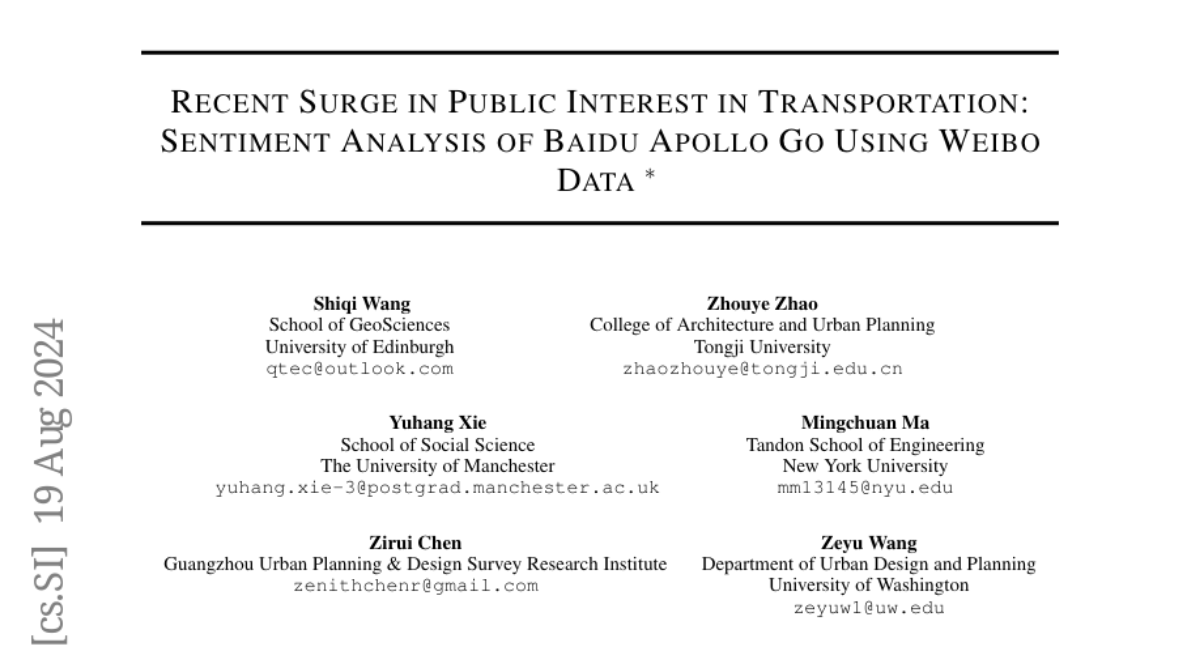Recent Surge in Public Interest in Transportation: Sentiment Analysis of Baidu Apollo Go Using Weibo Data
Shiqi Wang, Zhouye Zhao, Yuhang Xie, Mingchuan Ma, Zirui Chen, Zeyu Wang, Bohao Su, Wenrui Xu, Tianyi Li
2024-08-21

Summary
This paper analyzes public interest and sentiment towards Baidu's Apollo Go robotaxi service by examining social media posts from Weibo.
What's the problem?
As autonomous vehicle technology advances, services like Apollo Go are being deployed in cities, but it's essential to understand how the public feels about these changes. Previous studies may not have captured the full range of opinions or the nuances in sentiment regarding such services.
What's the solution?
The researchers conducted a sentiment analysis on over 36,000 Weibo posts related to Apollo Go from January to July 2024. They used a hybrid BERT model to assess public attitudes, revealing that while initial sentiment was mostly positive, negative comments increased significantly as the service gained popularity. They also analyzed how opinions varied by region, noting that some areas expressed optimism while others had concerns about job impacts and safety.
Why it matters?
This research is important because it provides insights into how people perceive autonomous ride-hailing services like Apollo Go. Understanding public sentiment can help policymakers and service providers address concerns and improve the technology, ensuring that it meets the needs and expectations of users.
Abstract
Urban mobility and transportation systems have been profoundly transformed by the advancement of autonomous vehicle technologies. Baidu Apollo Go, a pioneer robotaxi service from the Chinese tech giant Baidu, has recently been widely deployed in major cities like Beijing and Wuhan, sparking increased conversation and offering a glimpse into the future of urban mobility. This study investigates public attitudes towards Apollo Go across China using Sentiment Analysis with a hybrid BERT model on 36,096 Weibo posts from January to July 2024. The analysis shows that 89.56\% of posts related to Apollo Go are clustered in July. From January to July, public sentiment was mostly positive, but negative comments began to rise after it became a hot topic on July 21. Spatial analysis indicates a strong correlation between provinces with high discussion intensity and those where Apollo Go operates. Initially, Hubei and Guangdong dominated online posting volume, but by July, Guangdong, Beijing, and international regions had overtaken Hubei. Attitudes varied significantly among provinces, with Xinjiang and Qinghai showing optimism and Tibet and Gansu expressing concerns about the impact on traditional taxi services. Sentiment analysis revealed that positive comments focused on technology applications and personal experiences, while negative comments centered on job displacement and safety concerns. In summary, this study highlights the divergence in public perceptions of autonomous ride-hailing services, providing valuable insights for planners, policymakers, and service providers. The model is published on Hugging Face at https://huggingface.co/wsqstar/bert-finetuned-weibo-luobokuaipao and the repository on GitHub at https://github.com/GIStudio/trb2024.